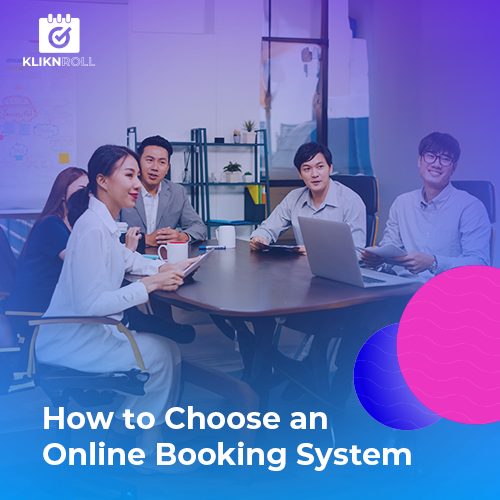Things to Consider Before Choosing an Online Booking System
Make Sure the Online Booking System Fits Your Industry
When choosing an online booking system, the most important thing to consider is whether the software can cater to your industry.
Different industries have different requirements, and a good booking system should be able to cater to any industry.
For example, if you run a spa or salon, you might want a ‘select stylist’ feature, or maybe service duration variability.
Or perhaps if you’re the owner of a local clinic, there might be a need for features like a place where customers can upload their medical records or have an online consultation integration.
Choose One That Allows You to Add Your Own Branding
Branding is becoming more important than ever, regardless of the industry, amidst rising competition.
This could mean being able to customize your booking page with your branding elements, like brand voice, aesthetics, etc.
You don’t want another company’s branding elements when your customers book a system.
So from the moment they land on your booking page, all the way to the confirmation emails, they receive, every interaction should reinforce your brand identity, and build trust with your customers.
This is important because according to statistics, 81% of consumers would need to trust a brand before making a purchasing decision.
This affects your overall conversion rate, as well as your perception of the market!
Ensure That You’re Able to Keep & Analyze Customer Data
Customer data is a key component in any online booking system and therefore, you should pick one that gives you complete access.
A lot of platforms on the market don’t give you access to customer data, whether it’s for your CRM or marketing purposes. These data include:
- Customer Preferences
- Booking History
- Heatmapping Data
- Demographic Data
Having access to data like these is incredibly important and lets you improve customer experience and boost conversion rate.
This means you’ll receive more bookings without spending more money on paid advertising!
Make Sure The Online Booking System is User-Friendly for Both Customers & Staff
Another crucial thing to take into consideration is how user-friendly the interface is, for both customers and staff.
For customers, this means a clean interface that makes it easy to find what they’re looking for and book the service they need.
On the flip side, your team should be able to manage bookings, make updates, and include remarks – all without needing to be a tech expert.
Of course, training from the developer is important – but the platform should be able to be operated without a manual in hand.
Most importantly, the booking system should also be mobile-friendly, for both the booking interface and the backend system.
According to Tech Report, 33% of customers prefer to book appointments through their phones, which is not a small amount.
Look Out for Aftersales Service or Value-Added Offerings
When you’re choosing an online booking software, it’s pretty important to consider the aftersales service, and value-added offerings by providers. These might include things like:
- Tech Support
- Customization Requests
- Product Training & Materials
- Industry Training & Seminars
- Support Availability
- Consulting
On top of that, value-added offerings are also important, which are things like marketing automation tools, CRM integration, data dashboards, and most importantly – the option for flexibility to scale.
Most companies will have a pricing plan for you to go through, make sure to take a look at the small details that come with certain plans.
Ask What Type of Support Is Available
The type and quality of support is also something that cannot be overlooked in this industry. Many companies, especially on more basic pricing plans, might only offer ticket-based support.
Ideally, you’ll want to find a pricing plan and company that gives you access to a dedicated account manager.
This will reduce the amount of time taken for the problem to be fixed, alongside not having to file tickets, which is difficult when you’re already short of staff.
Not to mention that an account manager can also give recommendations and offer tailored support to your business!
Other than technical support, take a look at the company’s website. Do they have things like a complete FAQ? Or perhaps a knowledge base? These resources can be a great help for issues that need an urgent fix.
Important Features That a Good Booking System Should Have
A Safe & Secure Deposit Payment Method
By far the most important feature an online booking system can have is a safe payment method that is user-friendly.
This gives customers trust and the confidence needed to follow through with pre-payment for appointments or perhaps a deposit.
We’d recommend finding a reputable payment gateway that is well-known, with examples like PayPal, Stripe, and Venmo.
Other than that, make sure that the platform is transparent and has iron-clad terms and conditions, just in case any mishaps occur.
Seamless Integration With Most Tools & Platforms
A core feature that any online reservation or booking software must have is integration with a large variety of tools and platforms.
It can be anything from a fully-fledged CRM to track and analyze data, an email marketing platform to send confirmations, or a chatbot platform to give updates to your customers – integration is key to many aspects of business operations.
Our online scheduling system can be integrated into many tools which include, but are not limited to:
- Marketing Platforms like MailChimp, Facebook Pixel, etc.
- Analytics Software like Google Analytics, etc.
- Payment Gateways like Stripe, Venmo, etc.
- Accounting Software like QuickBooks, Xero, etc.
- CRM like KlikNGo, Salesforce, etc.
Make Sure It Can Connect To Your Website
When choosing a booking system, make sure it seamlessly integrates with your website to provide a cohesive and streamlined user experience for your customers.
Look for options that offer plugins or API integration for easy setup and compatibility.
A direct connection between your booking system and website upholds your brand’s image and provides customers with a hassle-free booking journey.
It removes unnecessary redirections or extra steps, which could otherwise hinder the user experience.
Additionally, this integration capitalizes on your existing web traffic, turning visitors into booked clients.
By showcasing the booking options directly on your site, you can efficiently convert web visitors into customers, potentially leveraging content like your website’s blog to attract and convert visitors.
Furthermore, integrating an online booking system with your website can improve your search engine ranking for relevant navigational keywords.
When implemented correctly, your booking system’s subdomain can share website authority, enhancing SEO and visibility on search engines like Google.
Our booking system, Click2Book, promises a smooth and cost-free integration with your website, minimizing the effort required from you.
This ease of integration allows you to quickly benefit from a booking system that’s an extension of your website, enhancing your business operations right away!
Automated Reminders Before Appointment Timeslot
Automated reminders are a standard feature in most online booking platforms, but only the top-tier ones provide a diverse range of reminder channels.
These channels may include email, text messages, Facebook Messenger, Instagram Chat, or even automated calls.
Make sure that the booking system you choose offers robust settings, allowing for automatic processing of each appointment booking.
Also, look for options to set custom rules, such as sending a QR code validation email a specified time before the appointment, perhaps for security purposes.
Automated reminders play an important role in helping businesses reduce no-shows organically.
Rather than investing time and resources in manually making reminder calls or sending individual emails, the booking system can manage these communications automatically based on your predefined rules and settings.
Be on the lookout for features that enable the implementation of cancellation policies or provide options for customers to reschedule within the reminders section.
These functionalities add up to improve efficiency and customer satisfaction within the booking process!
Special Request Features & Scalability
To futureproof your investment, look for a booking system that offers customizable options to accommodate special requests from customers, such as dietary restrictions in restaurants, or maybe room preferences in hotels, or specific service requirements.
Scalability is another crucial aspect to assess. A good booking system should be able to grow with your business, handling increasing volumes of bookings, users, and data without sacrificing performance or functionality.
Think about factors like the system’s ability to handle peak booking periods, and support multiple locations or branches.
Furthermore, scalability doesn’t just mean handling increased volume. It also encompasses evolving business needs and industry trends.
A booking system should offer flexibility in terms of customization, configuration, and integration options, allowing you to tailor it to your specific requirements and integrate new features or technologies as they emerge.
Moreover, think about the system’s ability to accommodate different booking types. Maybe instead of just appointments, you want to try out large-scale events?
Why is Online Booking Better Than Traditional Ways of Booking?
Online booking is better than traditional ways of booking because of the numerous benefits for both businesses and customers.
For businesses, it provides valuable insights through data collection, reducing workload, and automating processes such as managing special requests and authenticating appointments.
Not to mention, it also improves marketing campaign conversions, enables bookings outside of working hours, and significantly reduces no-shows through automated reminders and deposit features.
Additionally, it allows for real-time management and adjustments of bookings and can easily adapt to industry changes.
It’s just not just for the business too – as for customers, online booking offers convenience and accessibility, catering to individuals with call phobia and facilitating effortless submission of special requests and booking changes.
It eliminates waiting on hold, ensures privacy for confidential bookings, and enables seamless feedback submission.
Overall, online booking enhances efficiency, convenience, and customer satisfaction compared to traditional methods, and offers a win-win for both businesses and customers!
Take a look at our online booking system (Click2Book) to find out more about our features!

Hey there! I’m Jeffrey Hau, and my journey in the digital world started after I wrapped up my psychology degree at UCLA. Imagine coming back to the bustling streets of Hong Kong from the tech haven of Silicon Valley – it was a whirlwind of inspiration! Seeing how social media platforms were evolving at breakneck speed and realizing the limitations of traditional advertising in this digital age, I decided to dive in.
In 2012, I laid the foundation of Prizm Group. From our humble beginnings, we’ve now blossomed into a global powerhouse with a team of over 200 passionate professionals. Our HQ is right here in Hong Kong, and we’ve spread our wings to SG, AU, NZ, JP, and China.
As a digital problem solver, our team found that several industries are in need of reservation systems, especially for F&B, Hotels, Beauty, and Medical sectors. Our digital magicians started crafting reservation systems tailored to cater to these specific needs. We extended our expertise to e-commerce, voucher management systems, and campaign management systems, combining them into KlikNRoll – an all-in-one solution. We deep dive into various industries, understanding their unique challenges and developing innovative solutions.
We’re not just a company; we’re your dedicated partners in transforming how you navigate the digital landscape. Our passion lies in providing businesses with intuitive and tailored solutions using KlikNRoll’s powerful capabilities.
Ready to embark on this exciting digital adventure with us? Let’s make your brand stand out in the digital jungle!






